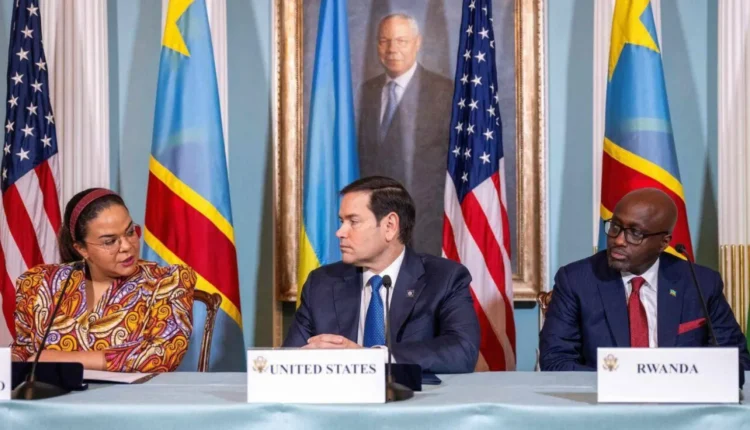Challenges and Prospects for the Peace Agreement Between Kinshasa and Kigali

Sudanhorizon – Othman Siddiq
On Friday, the foreign ministers of Rwanda and the Democratic Republic of the Congo (DRC) signed a peace agreement in Washington, D.C., aimed at addressing their long-standing disputes. The agreement includes the disarmament of the Democratic Forces for the Liberation of Rwanda (FDLR) militia. It aims to promote peace, disarm armed groups, ensure the safe return of refugees, and foster economic cooperation between the two countries.
The agreement is the result of diplomatic efforts led by the United States, with support and facilitation from Qatar, to resolve persistent tensions and promote cooperation in eastern Congo, a region plagued for years by conflict and humanitarian crises. Under the agreement, both Rwanda and the DRC committed to maintaining regional stability and promoting economic development.
U.S. President Donald Trump welcomed the deal, calling it an important step forward. Secretary of State Marco Rubio acknowledged the serious challenges ahead, stating that the United Nations and regional organisations would provide additional oversight to ensure the agreement yields concrete outcomes. Three members of the U.S. Senate also issued a joint statement hailing the agreement as a decisive step toward ending decades of conflict in eastern DRC.
They emphasised that the true challenge lies in implementation, urging both nations and their international partners to ensure effective enforcement. This includes improving humanitarian access for millions of displaced people in eastern Congo and the withdrawal of Rwandan forces from the region.
The senators also stressed the need for the Kinshasa government to halt its support for certain militias and ensure their disarmament. They highlighted the importance of addressing the ongoing violence—now spanning more than three decades—particularly its impact on women and children through justice and accountability mechanisms. Congressman Chris Smith introduced legislation in support of the peace deal, calling for a robust diplomatic, humanitarian, and economic response to the ongoing crisis in eastern Congo, which has resulted in the deaths of nearly 6 million people and mass displacement.
Confronting Chinese Influence
Congressman Smith also emphasised America’s leadership role in promoting peace and transparency in the region. He referred to a recent hearing on the negative influence of the Chinese Communist Party on Africa’s natural resources. His remarks subtly reflected the broader geo-economic competition over Africa’s vast natural wealth, especially precious minerals.
Notably, the peace agreement was signed during an event themed “U.S.-Africa Partnership”, echoing similar bilateral summits such as China–Africa, France–Africa, Germany–Africa, and Turkey–Africa. The United States now seeks to assist both Rwanda and the DRC in infrastructure development and responsible investment in key mineral sectors—a shift in approach prompted by China’s “win-win” partnership model, which has pressured Western nations to abandon their colonial-era condescension toward African leadership.
This global competition for African raw materials demands greater awareness, shared lessons, and strategic insight to ensure that future generations benefit from peace, development, and prosperity across the continent.
Qatari Mediation
Qatar played a key mediating role in the negotiations beginning in late 2024 and was represented at the signing ceremony in Washington by Minister of State for Foreign Affairs Mohammed bin Abdulaziz Al-Khulaifi. Qatar praised the agreement and commended the sincere political will of both parties to pursue peaceful, diplomatic solutions.
Minister Al-Khulaifi also highlighted Qatar’s role in facilitating negotiations and the summit held in March with the leadership of both countries. He expressed readiness to work with regional and international partners to achieve sustainable peace for the peoples of the region.
These efforts align with African Union mediation and the outcomes of the joint summit held on 8 February 2025 in Dar es Salaam, Tanzania, under the auspices of the East African Community and the Southern African Development Community (SADC).
Algeria also welcomed the agreement, calling it a major step toward restoring peace and security in the region. It expressed full support for the effective implementation of the accord and voiced hope that this diplomatic breakthrough would inspire similar solutions to other conflicts across Africa.
Regional Peace Is Essential
The signing of the agreement reflects both governments’ recognition of the complex challenges ahead and the critical importance of regional peace. It acknowledges the role of improved economic ties in reducing tensions and includes commitments to respect territorial integrity, end hostilities, and cease support for opposition movements targeting the governments in Kigali and Kinshasa.
The agreement also outlines plans for disengagement, disarmament of armed groups, reintegration of former fighters, and improved cross-border security cooperation—a major task in a region where over 100 armed groups operate, including the 23 March Movement (M23), raising concerns over enforcement.
Observers of African affairs note that the agreement may appear security-focused on the surface, but it carries economic undercurrents. It represents a field-level de-escalation whose durability hinges on political seriousness and transparent oversight mechanisms. Informed civil society monitoring will be the real guarantor of peace, even as governments and leaders change.
Above all, success will require firm rejection of the use of rebel groups as proxies for external interests—a reality that the coming months are likely to test.
Shortlink: https://sudanhorizon.com/?p=6255

